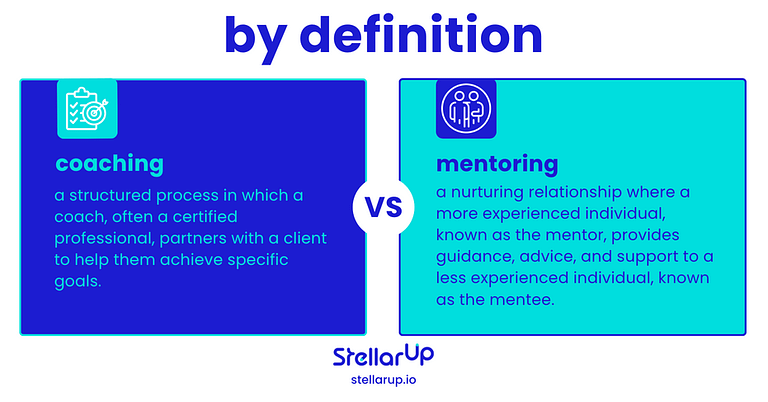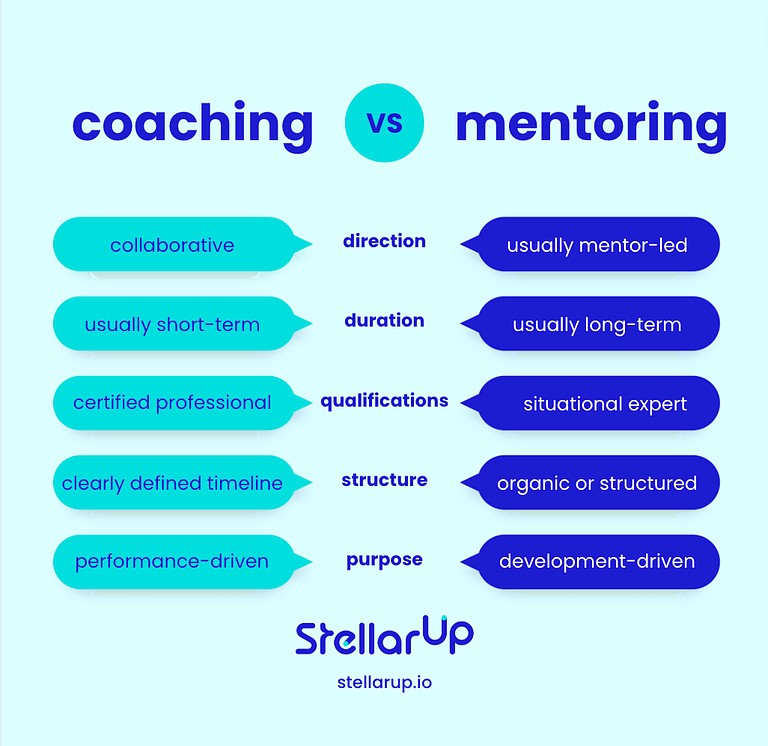Mentorship isn’t just a one-way street of advice and guidance; it’s a dynamic partnership that can shape your career and life in profound ways. The importance of asking the right questions cannot be overstated. In this comprehensive guide, we’ll delve deeper into the mentoring relationship. We’ll explore why these questions are essential, strategies to make the most of your mentorship, and how to apply what your mentor teaches you.
The Power of Asking the Right Questions
Before we dive into the specific questions to ask a mentor, it’s crucial to understand why asking the right questions is so pivotal in the mentorship process. Here’s why:
Focus and Clarity: Effective questions help you pinpoint your needs and goals, ensuring that your mentor’s guidance is tailored to your unique circumstances. Without clarity, mentorship can become vague and less productive.
Engagement and Rapport: Thoughtful questions demonstrate your commitment to the mentorship, engaging your mentor on a deeper level. It also fosters rapport, encouraging the mentor to truly invest in your success.
Knowledge Transfer: No matter the structure of your mentoring relationship – traditional older mentor and younger mentee, reverse mentorship, one-to-many mentorship – questions unlock the treasure trove of your mentor’s knowledge and experience. They provide a structured way to extract valuable insights that may not be shared otherwise.
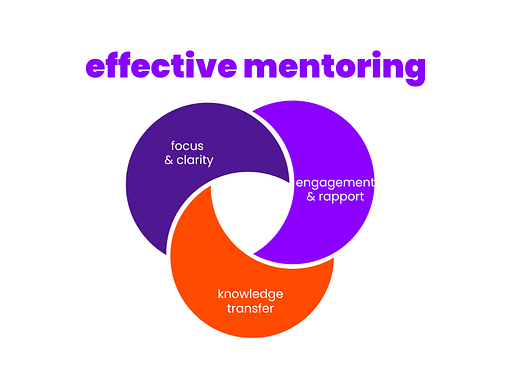
Questions to ask a mentor
As suggested by emily sobel, Executive Vice President of Savills – a commercial real estate titan in New York City – “True connection happens through transparency in two directions with open and honest dialogue. For a mentee to show a real commitment to being present, they should come with questions. Questions are the key to dialogue.” Taking Emily’s advice, let’s explore an extensive array of categories of questions to ask a mentor in detail, along with the rationale behind them:
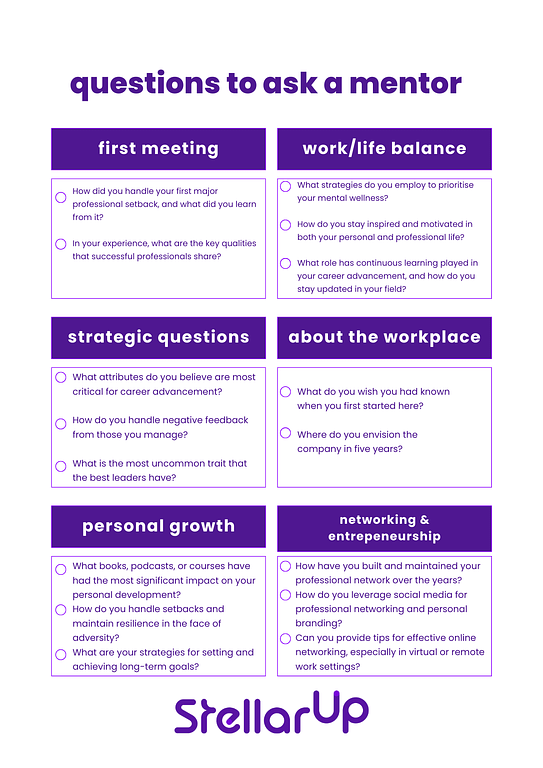
Questions to ask a mentor at your first meeting
- How did you handle your first major professional setback, and what did you learn from it?
- Rationale: Asking about how your mentor tackled a significant setback reveals their resilience and problem-solving skills. Learning from their experience can prepare you for similar challenges.
- Can you share an example of a challenging professional decision you had to make and how you arrived at your choice?
- Rationale: Understanding your mentor’s decision-making process can help you navigate complex choices in your career effectively.
- In your experience, what are the key qualities that successful professionals share?
- Rationale: Identifying common traits of successful professionals can guide your personal development and career strategies.
- What strategies have you found effective for time management and productivity in your career?
- Rationale: Time management is critical for career success. Learning your mentor’s strategies can improve your efficiency.
- How do you approach building and nurturing professional relationships in a new workplace?
- Rationale: Building rapport and connections are essential for career growth. Your mentor’s insights can help you establish a strong professional network.
Questions to ask a mentor about work-life balance:
- How do you maintain work-life balance while advancing in your career?
- Rationale: Balancing work and personal life is crucial for long-term career satisfaction and overall well-being.
- What strategies do you employ to prioritise your mental wellness?
- Rationale: Prioritising mental health is essential for maintaining high performance and avoiding burnout.
- How do you stay inspired and motivated in both your personal and professional life?
- Rationale: Sustaining motivation is key to overcoming challenges and achieving your goals.
- What role has continuous learning played in your career advancement, and how do you stay updated in your field?
- Rationale: Lifelong learning is vital for staying competitive in your industry. Your mentor’s approach can guide your professional development.
- Can you recommend any specific personal development books, podcasts, or courses that have had a significant impact on your life?
- Rationale: Seeking recommendations for resources can accelerate your personal growth journey.
- How do you handle moments of self-doubt or imposter syndrome, and what advice do you have for overcoming these feelings?
- Rationale: Coping with self-doubt is common in any career. Learning from your mentor’s strategies can boost your confidence.
- What are your strategies for maintaining a healthy work-life balance, and how has this contributed to your overall well-being?
- Rationale: Understanding your mentor’s work-life balance practices can help you find your own equilibrium.
- How do you set and prioritise your personal goals, and what methods do you use to track your progress toward them?
- Rationale: Goal-setting is essential for personal growth. Your mentor’s approach can inspire effective goal-setting strategies.
Strategic questions to ask a mentor:
About Careers:
- Are you assertive or passive in the workplace, and what are the strengths and weaknesses of each approach?
- Rationale: Understanding different workplace approaches helps you adapt to various situations.
- What attributes do you believe are most critical for career advancement?
- Rationale: Identifying key traits for career success can guide your professional development.
- What guiding principles do you follow when making career decisions?
- Rationale: Discussing ethical considerations in career choices can help you make sound decisions.
About Leadership:
- How do you maintain focus and motivation outside of work to be a better leader within your team?
- Rationale: Balancing personal and professional leadership skills is vital for effective leadership.
- How do you handle negative feedback from those you manage?
- Rationale: Addressing challenges in leadership helps you become a more resilient leader.
- What is the most uncommon trait that the best leaders have?
- Rationale: Exploring unique leadership qualities can set you apart as a leader.
Questions for workplace mentors:
- How did you come to join this company, and how does it compare to your previous employers?
- Rationale: Understanding your mentor’s workplace journey provides insights into the company’s culture and values.
- What do you wish you had known when you first started here?
- Rationale: Learning from your mentor’s early experiences can help you navigate your workplace more effectively.
- Where do you envision the company in five years?
- Rationale: Gaining insights into the company’s future can inform your career decisions and goals.
Questions to ask a mentor for personal growth:
- What books, podcasts, or courses have had the most significant impact on your personal development?
- Rationale: Exploring resources for self-improvement can enhance your personal growth journey.
- How do you handle setbacks and maintain resilience in the face of adversity?
- Rationale: Developing resilience is essential for personal growth and overcoming challenges.
- What are your strategies for setting and achieving long-term goals?
- Rationale: Goal-setting is a fundamental aspect of personal development, and your mentor’s strategies can be invaluable.
Questions to ask a mentor about networking:
- How have you built and maintained your professional network over the years?
- Rationale: Networking is a valuable career asset. Learning your mentor’s networking strategies can help you expand your own network effectively.
- What are your top tips for effective networking at industry events?
- Rationale: Strategies for making meaningful connections at events can enhance your networking skills.
- How do you approach building relationships with colleagues and superiors within your organisation?
- Rationale: Building rapport within your workplace is crucial for career growth and success.
- Can you share a memorable networking experience that had a positive impact on your career?
- Rationale: Learning from your mentor’s experiences can provide valuable insights into the power of networking.
- How do you approach networking events or conferences with the goal of building meaningful connections?
- Rationale: Understanding effective strategies for networking at events can help you make the most of such opportunities.
- What are some effective ways to leverage social media for professional networking and personal branding?
- Rationale: In the digital age, online networking and personal branding are essential. Your mentor’s insights can guide your online presence.
- How do you manage and maintain relationships with your professional contacts over the long term?
- Rationale: Maintaining long-term relationships with contacts is crucial for ongoing career growth and support.
- Can you provide tips for effective online networking, especially in virtual or remote work settings?
- Rationale: In remote work environments, online networking skills are particularly valuable. Your mentor’s advice can help you excel in this context.
Questions for entrepreneurial mentors:
- What challenges did you face when starting your own business, and how did you overcome them?
- Rationale: Learning from entrepreneurial experiences can prepare you for the challenges of starting your own venture.
- What are the key factors you consider when evaluating new business opportunities?
- Rationale: Understanding how to assess business opportunities is essential for aspiring entrepreneurs.
- How do you manage risk and uncertainty in the business world?
- Rationale: Strategies for navigating risk and uncertainty are crucial for entrepreneurial success.
- What advice do you have for individuals considering entrepreneurship as a career path?
- Rationale: Your mentor’s advice can provide valuable insights for those interested in entrepreneurship.
- How do you identify market opportunities and trends in your industry?
- Rationale: Recognizing market opportunities is key to successful entrepreneurship.
- Can you share a specific example of a challenging moment in your entrepreneurial journey and how you navigated it?
- Rationale: Learning from your mentor’s real-world experiences can help you address similar challenges.
- What resources or support systems did you find most valuable when starting your own business?
- Rationale: Knowing which resources and support systems to leverage can facilitate your entrepreneurial journey.
Strategies for maximising your mentorship
Asking the right questions is just one facet of a successful mentorship. Here are additional strategies to make the most of your mentoring relationship:
Set Clear Goals: Work with your mentor to establish specific, measurable, attainable, relevant, and time-bound (SMART) goals. These goals provide a roadmap for your mentorship journey.
Maintain Regular Communication: Establish a consistent meeting schedule and mode of communication with your mentor. This ensures ongoing support and guidance.
Seek Feedback Actively: Don’t wait for feedback to come to you; actively seek it from your mentor. embrace constructive criticism as an opportunity for growth.
Practice What You Learn: Apply the insights and advice provided by your mentor in your day-to-day activities. Experimentation and learning by doing are powerful tools for growth.
Celebrate Achievements: Acknowledge and celebrate milestones with your mentor. This fosters a positive and motivating mentorship environment.
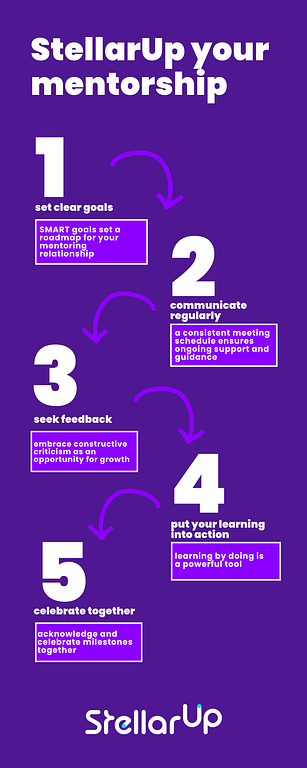
Final thoughts
Mentorship is a transformative journey, and the questions you ask are your compass. By understanding the significance of asking the right questions, delving into key categories, and implementing strategies for success, you can unlock the full potential of your mentoring relationship.
Remember, mentorship is not just about gaining knowledge; it’s about applying that knowledge and growing both personally and professionally. So, ask, engage, learn, and thrive with your mentor by your side.
